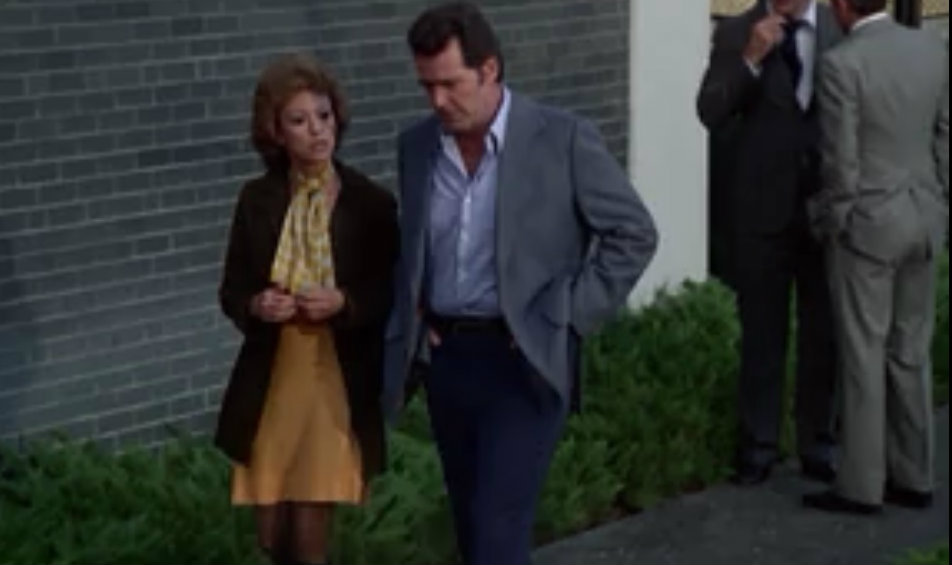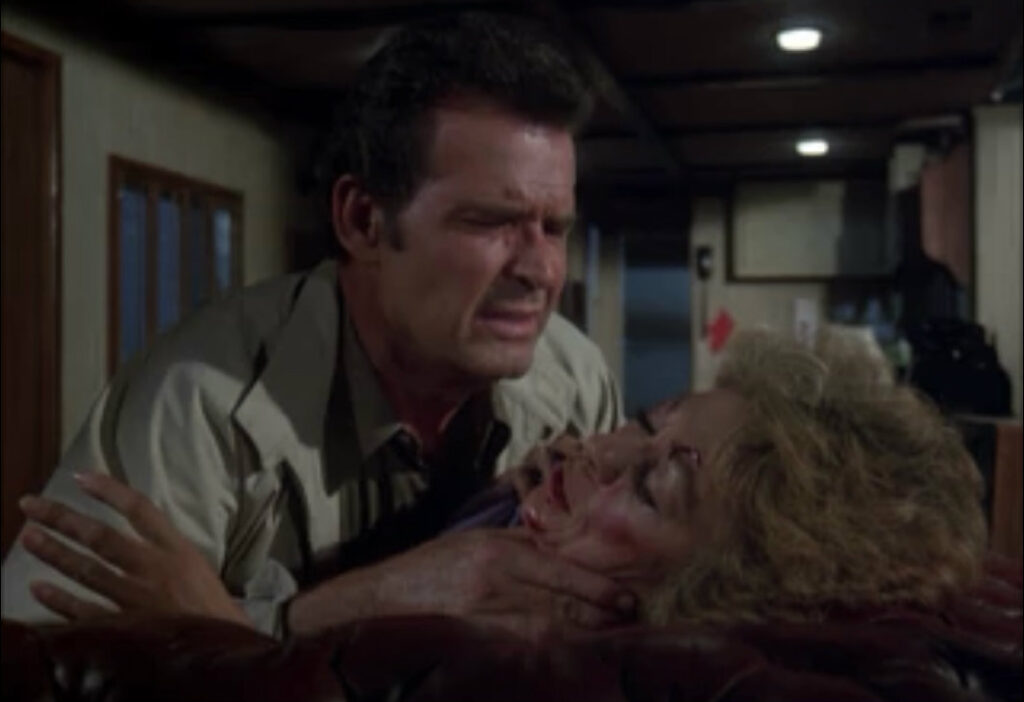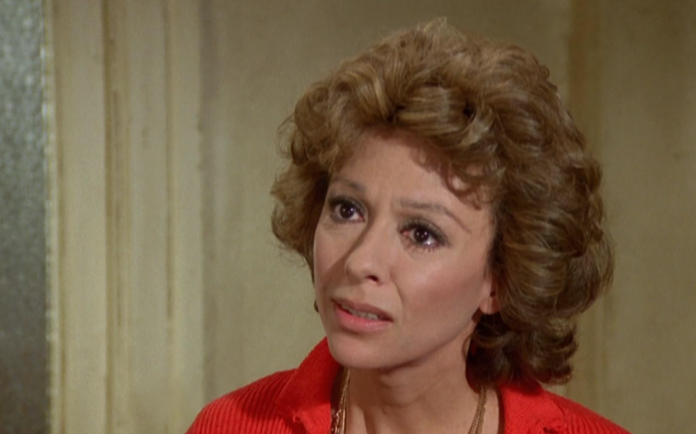Rita Capkovic appeared in three episodes of The Rockford Files and one television movie. In total, her screen time amounted to approximately five hours in a series that encompassed six seasons, 122 episodes, and eight movies.
Given these statistics, it might seem unlikely for her to have left a lasting impact on viewers or the series as a whole. However, Rita Capkovic was no ordinary recurring character.
The role was brought to life by none other than the iconic and accomplished Rita Moreno, who boasts an EGOT status (having won an Emmy, Grammy, Oscar, and Tony Award). Rita Moreno is a truly unforgettable figure in the entertainment world.
Rita Capkovic featured in three episodes of The Rockford Files and appeared in a television movie. Altogether, her on-screen presence totalled around five hours in a series that spanned six seasons, consisting of 122 episodes and eight movies.
Looking at these numbers, it might appear improbable for her to have made a lasting impression on the audience or the series itself. Nevertheless, Rita Capkovic was far from your typical recurring character.
The role was brilliantly portrayed by the iconic and highly accomplished Rita Moreno, a distinguished EGOT recipient (having earned Emmy, Grammy, Oscar, and Tony Awards).
Rita Moreno unquestionably stands as a truly unforgettable figure in the realm of entertainment.
Moreno stands among the exclusive circle of EGOT winners, a group numbering just eleven individuals in the entire entertainment industry. Remarkably, she holds the distinction of being the sole Hispanic performer to have attained this prestigious honor.
Her Oscar victory, accompanied by a Golden Globe, was secured for her portrayal of Anita in West Side Story.
Interestingly, after claiming her coveted Oscar trophy, Moreno made a principled decision to abstain from accepting another film role for a seven-year period.
As she candidly shared with Tavis Smiley, her return to the silver screen only transpired when Hollywood began to offer roles that defied the stereotypical “Conchitas and Lolitas.”
Even with this substantial hiatus, Moreno’s career remains extensive, boasting a remarkable 141 credited roles.
These encompass a diverse range of characters, from lending her voice to the beloved animated figure Carman Sandiego to portraying the resolute Sister Peter Marie in Oz and taking on the role of Louise in Mike Nichols’ provocative 1971 film Carnal Knowledge.
This tally doesn’t even include her numerous contributions to the theater world.
Furthermore, Moreno is an impassioned activist who actively participated in the March on Washington and has received esteemed accolades such as the Presidential Medal of Freedom in 2004 and the National Medal of Arts in 2009.
Clearly, when I referred to her as a living legend, I was not engaging in hyperbole.
Considering the extensive and diverse nature of Moreno’s career, one might expect that her portrayal of Rita Capkovic, a classic trope of a kind-hearted prostitute who occasionally partnered with Jim Rockford (James Garner), would hardly register as a significant accomplishment.
However, Moreno’s performance in this role earned her not one but two Emmy nominations, with the ultimate honor of winning one. It’s worth noting that she achieved this recognition despite appearing in only three episodes in total.
What, then, sets Rita apart and makes her a standout character? At first glance, she embodies every stereotypical portrayal of a prostitute that television often gravitates toward.
She exudes kindness and an innate spirit of generosity, always putting others’ needs ahead of her own without a second thought. Her character is marked by an innocence that intriguingly contrasts with her sexuality, a dynamic that Hollywood frequently finds irresistible.
This innocence is not solely evident in her demeanor but is also conveyed through the visual symbolism of her apartment, filled with stuffed animals. It’s a portrayal that simultaneously infantilizes and sexualizes her character.
However, it’s essential to recognize that this external presentation doesn’t necessarily define the core essence of who Rita truly is.

Rita Capkovic makes her debut in the fourth season episode titled “The Paper Palace,” a briskly paced installment.
In this episode, Rita seeks friendship from Sergeant Dennis Becker (Joe Santos) and assistance in dealing with two persistent French men who frequently visit her.
The initial introduction to Rita occurs as she gets booked by the authorities following her arrest for public solicitation.
What’s intriguing is that, even before uttering a single word, the episode’s writer, Juanita Bartlett, provides us with a significant insight into the character by revealing that Rita identifies her profession as a “poet.”
What’s indeed striking about both “The Paper Palace” and Rita Moreno’s subsequent appearance in the following year during season five’s “Rosendahl and Gilda Stern Are Dead” is Rita’s unwavering lack of apology for her chosen profession.
“The Paper Palace” originally aired in 1978, a period when the sexual revolution had already swept across America, leading to evolving attitudes about sex and morality.
Nevertheless, even during this era of sexual liberation, society’s view of sex workers remained predominantly negative.
In The Rockford Files, this negativity is reflected through the portrayal of several characters, particularly those in positions of authority.
They openly express the notion that Rita is somehow tarnished or devoid of worth because of her involvement in exchanging sex for money.
Amidst the constant barrage of criticism and disparagement, Rita remains resolute and unapologetic for her chosen path. In fact, shortly after their initial encounter, she candidly expresses to Rockford:
“I do what I do. I’m not going to offer apologies, and I won’t provide explanations.”

The series astutely acknowledges the striking parallels between Rita and Rockford. In the eyes of the public, Rockford’s occupation as a private investigator is only marginally more respectable than Rita’s profession.
Furthermore, both have experienced time behind bars. These shared experiences swiftly forge a sense of kinship between them.
It’s the deepening connection that evolves as Rockford assists Rita in unraveling the mystery surrounding the two men determined to harm her that fuels her subsequent appearances in the series.
As “The Paper Palace” draws to a close, Rita unexpectedly acquires a significant sum of money, giving her an opportunity to depart from her life as a prostitute.
Every character, including Rockford and extending to Dennis and his spouse, fervently advocates for Rita to use the funds to purchase a home and establish a settled life.
Each of them imposes their personal concept of an ideal life onto Rita, disregarding her objections.
Rita insists that she finds satisfaction in apartment living, subtly implying her contentment with her current lifestyle—an idea alluded to rather than explicitly articulated.
The mere suggestion itself is quite bold, and the series fearlessly provides a glimpse into the intricacies of Rita’s daily existence when Rockford spends a night at her apartment during a stakeout.
Throughout the evening, he fields numerous phone calls from clients inquiring about Rita and receives visits at the door from others seeking her services.
The notion that Rita has willingly embraced her profession as a prostitute, rather than being coerced into it, reflects a distinctly third-wave feminist perspective, a viewpoint that challenges convention, especially given the context of the second-wave era in which the series unfolds.
Upon Rita’s reappearance in “Rosendahl and Gilda Stern Are Dead,” it becomes evident that she has depleted the entirety of the inheritance she acquired in “The Paper Palace,” leading her back to her work on the streets.

As the series has previously underscored Rita’s unwavering selflessness, it’s noteworthy that most of her funds were devoted to helping others, with a significant portion benefiting an unseen individual, rather ironically.
Her personal expenditures primarily encompassed securing a more upscale apartment, acquiring clothing, and purchasing a microwave.
Rita reenters Rockford’s life under a cloud of suspicion, accused of murdering a surgeon who was last seen leaving a hotel with her.
While Rockford typically refrains from passing judgment on Rita’s life choices, he can’t help but feel both disappointed and perplexed by how rapidly she depleted her finances.
He raises this concern multiple times, emphasizing that the money was intended to provide her with a sense of “security,” a euphemism for a way out of her involvement in prostitution.
Rita counters his inquiries with a resolute stance, asking, “Jim, what’s someone like me going to do with security?” She goes on to assert that she has no desire for a “little house.”
Even as she confronts the grave charge of murder, Rita steadfastly refuses to be intimidated or subdued.
In her initial two appearances, Moreno infuses Rita with an abundance of boldness and self-assuredness.
While Rita may be a relatively modest role compared to some of the other characters Moreno portrayed in her illustrious career, Moreno’s performance radiates a fearless sense of pride that imbues Rita with her distinctive edge.
Even if Moreno hadn’t shared a long-standing friendship with Garner, it’s evident why an actor of her caliber would be drawn to the role, given how intricately Rita’s character is developed.
Regrettably, in her final appearance in season six’s “No Fault Affair,” Rita was not allowed to retain her pride or the depth of character that had defined her in earlier episodes.
The episode follows a predictable narrative, serving as a conventional cautionary tale about the perils of prostitution. It also attempts, in a rather cringe-inducing manner, to explore a potential romantic connection between Rockford and Rita.
This time, Rita makes her entrance to display a new beautician’s license proudly and to declare her intention to leave behind her life on the streets. In essence, Rita’s decision to pursue a mainstream profession isn’t inherently problematic.
However, the issue arises when Rita, who had previously seemed to operate independently—recalls that her clients didn’t involve a middleman in “The Paper Palace”—is thrust into a distressing scenario.
She becomes entangled with a violent pimp who subjects her to brutal physical abuse after she encourages a young woman, also under his control, to leave the streets.
The entire situation strays so far from what we’ve previously understood about Rita that it would almost be comical if it weren’t so unsettling.
Matters take an even darker turn as it becomes evident that Rita’s brutal beating was merely a contrived plot device to place her inside Rockford’s trailer, all for the purpose of exploring the notion of a romantic connection between the two.
Strikingly, everyone in Rockford‘s circle reacts with dismay at the prospect, a stark contrast to the earlier portrayal of Rita and Rockford as kindred spirits.
Adding to the complexity of the situation, Rita’s behavior begins to shift dramatically. She becomes excessively preoccupied with Rockford’s life, evolving into a clingy caricature that starkly contrasts with the free-spirited persona she had embodied previously.
Towards the conclusion of the episode, there’s a slight shift in dynamics when Rita selflessly puts herself in harm’s way to shield Rockford from a bullet.
However, this redemptive moment comes too late to salvage what is ultimately deemed a subpar episode.
Even the final scene, in which Rockford and Rita exchange tentative “I love yous” before reverting to their usual banter, is marred by the preceding chaos.
It’s noteworthy that, despite this being one of Moreno’s more prominent appearances on The Rockford Files, it is the only one for which she did not receive an Emmy nomination.
Rita ultimately returned to the Rockford franchise in the last TV movie, If It Bleeds…It Leads, in 1999.
In this installment, she portrayed an older, married incarnation of Rita, who eventually embraced the security concept that Rockford (the man who resided in a beachfront trailer) had persistently advocated.
However, it’s perhaps most fitting to remember her as she initially appeared when she entered the series: humorous, courageous, and unapologetic—a poet whose talents were underappreciated in her time.
Previously on Women in the Box: Friends‘ Rachel, Monica, and Phoebe


